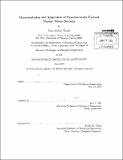Hypermutation and adaptation of experimentally evolved marine Vibrio bacteria
Author(s)
Clarke, Sean Aidan
DownloadFull printable version (8.392Mb)
Other Contributors
Massachusetts Institute of Technology. Department of Biological Engineering.
Advisor
Eric J. Alm.
Terms of use
Metadata
Show full item recordAbstract
Environmental bacteria display tremendous genetic diversity, but we are still learning how this diversity arises and relates to their wide range of habitats. Investigating how bacteria adapt helps us understand their contributions to environmental processes and informs forward engineering of bacteria for industrial applications. Experimental evolution is a powerful approach, with microbes especially, but it has mostly been applied to model organisms and metabolic functions. In the work here, we investigated the possibility, degree, and variability of adaptation of an environmental Vibrio strain by applying a little-used selection method appropriate to a relevant condition, salinity. We successfully isolated mutants with higher salt tolerance by selecting on salt gradient plates. Resequencing the genomes of the evolved strains revealed unprecedented hypermutation in three of nine parallel lineages. These mutator lines arose independently, and each of them accumulated more than 1500 single-base mutations. By comparison, there are only 302 single-base differences between the ancestor strain and another strain isolated in the wild. Hypermutation was associated with a deletion resulting from improper prophage excision. Members of this family of prophages are found in other proteobacteria, including well-studied human pathogens, from very different environments. Mutators are known to arise spontaneously in wild and clinical bacteria, but the extent of their adaptive contribution is unknown. We have preliminary evidence that this mechanism of evolution could be relevant in the environment, where horizontal gene transfer and mobile elements play known, significant roles in bacterial evolution.
Description
Thesis (Ph. D.)--Massachusetts Institute of Technology, Dept. of Biological Engineering, 2013. Cataloged from PDF version of thesis. Includes bibliographical references (p. 73-83).
Date issued
2013Department
Massachusetts Institute of Technology. Department of Biological EngineeringPublisher
Massachusetts Institute of Technology
Keywords
Biological Engineering.